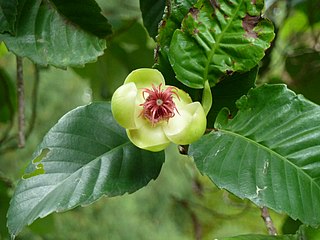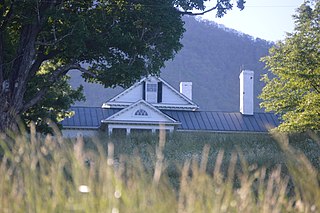
The Battle of Pharsalus was the decisive battle of Caesar's Civil War fought on 9 August 48 BC near Pharsalus in Central Greece. Julius Caesar and his allies formed up opposite the army of the Roman Republic under the command of Pompey. Pompey had the backing of a majority of Roman senators and his army significantly outnumbered the veteran Caesarian legions.

Marcus Annaeus Lucanus, better known in English as Lucan, was a Roman poet, born in Corduba, Hispania Baetica. He is regarded as one of the outstanding figures of the Imperial Latin period, known in particular for his epic Pharsalia. His youth and speed of composition set him apart from other poets.

Pharsalia is a town in Chenango County, New York, United States. The population was 593 at the 2010 census. The town was named after Pharsalia, which is a commonly accepted name of the decisive battle in the Great Roman Civil War, where Julius Caesar defeated Pompey in 48 BCE.

In Roman literature, Erichtho is a legendary Thessalian witch who appears in several literary works. She is noted for her horrifying appearance and her impious ways. Her first major role was in the Roman poet Lucan's epic Pharsalia, which details Caesar's Civil War. In the work, Pompey the Great's son, Sextus Pompeius, seeks her, hoping that she will be able to reveal the future concerning the imminent Battle of Pharsalus. In a gruesome scene, she finds a dead body, fills it with potions, and raises it from the dead. The corpse describes a civil war that is plaguing the underworld and delivers a prophecy about what fate lies in store for Pompey and his kin.

De Bello Civili, more commonly referred to as the Pharsalia, is a Roman epic poem written by the poet Lucan, detailing the civil war between Julius Caesar and the forces of the Roman Senate led by Pompey the Great. The poem's title is a reference to the Battle of Pharsalus, which occurred in 48 BC, near Pharsalus, Thessaly, in Northern Greece. Caesar decisively defeated Pompey in this battle, which occupies all of the epic's seventh book. In the early twentieth century, translator J. D. Duff, while arguing that "no reasonable judgment can rank Lucan among the world's great epic poets", notes that the work is notable for Lucan's decision to eschew divine intervention and downplay supernatural occurrences in the events of the story. Scholarly estimation of Lucan's poem and poetry has since changed, as explained by commentator Philip Hardie in 2013: "In recent decades, it has undergone a thorough critical re-evaluation, to re-emerge as a major expression of Neronian politics and aesthetics, a poem whose studied artifice enacts a complex relationship between poetic fantasy and historical reality."

The Philippine cobra also called Philippine spitting cobra or northern Philippine cobra, is a stocky, highly venomous species of spitting cobra native to the northern regions of the Philippines. The Philippine cobra is called ulupong in Tagalog, carasaen in Ilocano.

Nepenthes philippinensis is a tropical pitcher plant endemic to the Philippines. It is known from Palawan and the neighbouring Calamian Islands and Linapacan, where it grows at 0–600 metres (2,000 ft) above sea level.

Pharsalia Technologies, Inc. was founded in December 1999, located in Roswell, Georgia, as an emerging company developing network infrastructure products for the Internet market. Led by a team of over 28 software engineers, Pharsalia focused on developing software products for the rapidly escalating content delivery market. The company was headed by Chip Howes, whose team is the inventor of record for over 30 patents in the area of TCP/IP server load balancing, and are credited with the invention of the technology in 1996.

Gignac is a commune in the Hérault département in the Occitanie region in southern France.

The Philippine tree squirrel is a species of rodent in the family Sciuridae which is endemic to the Philippines. The Philippine tree squirrel can only be found in Palawan, Bohol, Leyte and Samar and in Siargao. It is locally known as laksoy or kulagsing in the Visayan languages, like other endemic Philippine squirrels.

The large-eared horseshoe bat is a species of bat in the family Rhinolophidae. It is found in Australia, Indonesia, Malaysia, Papua New Guinea, and the Philippines.
Capillaria philippinensis is a parasitic nematode which causes intestinal capillariasis. This sometimes fatal disease was first discovered in Northern Luzon, Philippines, in 1964. Cases have also been reported from China, Egypt, Indonesia, Iran, Japan, Korea, Lao PDR, Taiwan and Thailand. Cases diagnosed in Italy and Spain were believed to be acquired abroad, with one case possibly contracted in Colombia. The natural life cycle of C. philippinensis is believed to involve fish as intermediate hosts, and fish-eating birds as definitive hosts. Humans acquire C. philippinensis by eating small species of infested fish whole and raw.

Intestinal capillariasis is a disease in the group of helminthiasis diseases caused by the nematode Capillaria philippinensis.
Toutatis or Teutates is a Celtic god who was worshipped primarily in ancient Gaul and Britain. His name means "god of the tribe", and he has been widely interpreted as a tribal protector. According to Roman writer Lucan, the Gauls offered human sacrifices to him.

Hawkins Pharsalia is a historic home located at Ruthsburg, Queen Anne's County, Maryland, United States. It is a 1+1⁄2-story, three-bay, single-pile gambrel-roofed brick dwelling constructed c. 1829, according to a 2015 dendrochronological study by the Oxford Tree-Ring Laboratory. It is one of the best preserved small early-19th century houses in Queen Anne's County, according to the Maryland Historical Trust. Additionally on the property is a brick smokehouse.

Dillenia philippinensis (katmon) is endemic to the Philippines and can be used for urban greening. Its fruit is known as elephant apple. Katmon grows in low to medium altitude forests throughout the Philippines, but does not survive the cold climates of the uplands.

Pharsalia is a historic plantation house and farm complex located near Tyro, Nelson County, Virginia. The main house was built between 1814 and 1816 using slave labor, and is a one-story, 11 bay, linear, single-pile, Federal style, frame manor house. It has a standing seam metal gable roof and features a three-bay porch with a gable roof. It was enlarged in the mid-19th century to its current T-shaped plan. Also on the property are the contributing kitchen / laundry / slave hospital (1834), icehouse / School, crib barn, smokehouse (1814), weaving Room, several slave quarters, and privy. Also on the property are the sites of a commercial smokehouse and mill.

Pharsalia is a genus of long-horned beetles in the family Cerambycidae. There are at least 40 described species in Pharsalia, found mainly in South and Southeast Asia.>
In Greek mythology, Hesperia or Hesperie, may refer to the following characters and places:
East Pharsalia is a hamlet in Chenango County, New York, United States. The community is 10 miles (16 km) west of Norwich. East Pharsalia had a post office from March 10, 1830 until September 28, 2002; it still has its own ZIP code, 13758.















